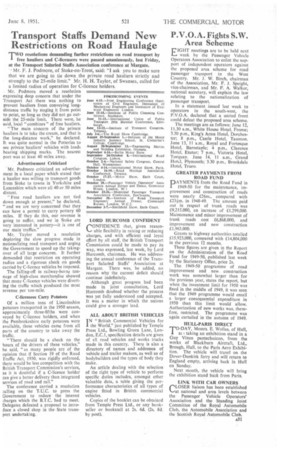Transport Staffs Demand New Restrictions on Road Haulage
Page 33

If you've noticed an error in this article please click here to report it so we can fix it.
TWO resolutions demanding further restrictions on road transport by I free hauliers and C-licensees were passed unanimously, last Friday, at the Transport Salaried Staffs Association conference at Margate.
Mr. F. J. Podmore, of Stoke-on-Trent, said: "I ask you to make sure that we are going to tie down the private road hauliers strictly and strongly to the 25-mile limit." Mr. H. H. Taylor, of Swansea, called for
a limited radius of operation for C-licence holders.
Mr. Podmore moved a resolution expressing deep concern that under the Transport Act there was nothing to prevent hauliers from conveying longdistance traffic by staging it from point to point, so long as they did not go outside the 25-mile limit. There were, he said, local "combines" of free hauliers.
"The main concern of the private hauliers is to take the cream, and that is the long-distance work," he declared. It was quite normal in the Potteries to see private hauliers' vehicles with loads bearing shipping marks. The nearest port was at least 40 miles away.
Advertisement Criticized
Mr. Podmore criticized an advertisement in a local paper which stated that a haulier was willing to transport goods from Stoke to towns in Yorkshire and Lancashire which were all 40 or 50 miles distant.
"Free road hauliers are not tied down enough at present," he declared, "and we are very concerned that they can have a permit to carry pottery 60 miles. If they do this, our revenue is going to suffer, and we in Stoke are very interested in pottery—it is one of our main traffics."
Mr. Taylor moved a resolution deploring the slow progress made in nationalizing road transport and urging the Government to speed up the takingover of all large concerns. It further demanded that restriction on operating radius and a rigorous check on goods carried by C-licence vehicles be imposed.
The falling-off in railway-borne tonnage of high-class merchandise showed that many C-licence vehicles were diverting the traffic which produced the most revenue per ton-mile.
C-licensees Carry Potatoes
Of a million tons of Lincolnshire potatoes transported in the 1950 season, approximately three-fifths were conveyed by C-licence holders, and when the Pembrokeshire early potatoes were available, these vehicles came from all parts of the country to take away the traffic.
"There should be a check on the hours of the drivers of these vehicles," he said, "as many people are of the opinion that if Section 19 of the Road Traffic Act, 1930, was rigidly enforced, there would be less competition with the British Transport Commission's services, as it is doubtful if a C-licence holder can give a better delivery than integrated services of road and rail."
The conference carried a resolution :ailing on the T.U.C. to press the Government to reduce the interest z.harges which the B.T.C. had to meet. Delegates defeated a proposal to introJuce a closed shop in the State transport undertaking.
LORD HURCOMB CONFIDENT
CONFTDENCE that, given reasonable flexibility in raising or reducing charges, and with efficient and loyal effort by all staff, the British Transport Commission could be made to pay its way, was expressed, last week, by Lord Hurcomb, chairman. He was addressing the annual conference of the Transport Salaried Staffs' Association at Margate. There was, he added, no reason why the current deficit should continue indefinitely.
Although great progress had been made in joint consultation, Lord Hurcomb doubted whether the process was yet fully understood and accepted. It was a matter in which the unions could give a stronger lead.
ALL ABOUT BRITISH VEHICLES
"British Commercial Vehicles for
the World," just published by Temple Press Ltd., Bowling Green Lane, London, E.C.1, specification details are given of all road vehicles and works trucks made in this country. There is also a directory of names and addresses of vehicle and trailer makers, as well as of bodybuilders and the types of body they make.
An article dealing with the selection of the right type of vehicle to perform specific duties includes, amongst other valuable data, a table giving the performance characteristics of all types of engine fitted in British commercial vehicles.
Copies of the booklet can be obtained from Temple Press Ltd., or any bookseller or bookstall at 2s. 6d. (2s. 8d. by post).




















































































